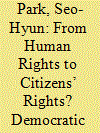| Srl | Item |
| 1 |
ID:
186102


|
|
|
|
|
| Summary/Abstract |
After the Fukushima nuclear meltdown, the Angela Merkel government in Germany officially announced its decision to permanently shut down all of its seventeen nuclear reactors. In closer proximity to Fukushima, the Lee Myung-bak government in South Korea expanded its nuclear energy program with specific plans to construct more nuclear reactors in various locations and pursued more export opportunities. It was only in 2017 that the South Korean government, under President Moon Jae-in, announced a gradual phase-out of nuclear power plants in South Korea. What explains the contrasting paths of the German and South Korean nuclear energy programs in the immediate aftermath of the Fukushima nuclear disaster? Why did the same external shock prompt sudden policy reversal in Germany while it took six more years for South Korea to turn its course? While existing studies are helpful in accounting for the rise of particular energy policies, they are insufficient for explaining the causes and specific timing of major policy reversals in the face of external crises. Building upon the literature on political opportunity structures, this article argues that the emergence of new political opportunities and the shift in political framing with respect to nuclear energy caused nuclear phase-out in both countries. A closer look at the two national cases offers an opportunity to delineate the domestic political process of nuclear energy policymaking and evaluate the role of exogenous shocks, such as a major nuclear disaster, in shifting political opportunity structure and reshaping the perceptions of energy security and political risks.
|
|
|
|
|
|
|
|
|
|
|
|
|
|
|
|
| 2 |
ID:
193639


|
|
|
|
|
| Summary/Abstract |
In 2018, the South Korean government denied refugee status to all but two of the almost 500 Yemenis who, fleeing civil war in their home country, had arrived earlier in the year on the resort island of Jeju. This decision was made in the context of a short-lived but intense public backlash, even though the overall number of refugees has remained consistently low. Three years later, nearly 400 Afghans were evacuated to South Korea with government support and little controversy. What explains these different patterns of refugee politicization in South Korea? I argue that the 2018 episode of anti-refugee activism in South Korea does not follow the typical script in immigration politics which pits “natives” against “outsiders”; rather, it is a reflection of internal political divisions. In this article, I focus on political framing contests involving governmental and non-governmental actors that draw upon prior rhetorical frames of political mobilization which had developed in a broader context of state-building, development, and democratization. The 2018 Jeju “crisis” was partially a reaction against state-led multiculturalism (damunhwa), which had gained momentum since the 2000s. It also signalled a political backlash against previous decades of social and political movements that framed labour rights, migrant workers’ rights, and other minority rights as a necessary expansion of human rights befitting a responsible “advanced nation.” At the same time, the varied responses to the arrival of Yemenis in 2018 and Afghans in 2021 show that the coherence and resonance of competing political frames during key moments can help explain the type and degree of political mobilization on refugee policy. Furthermore, these comparative case studies show that South Korean attitudes toward refugees have not settled into stable political-economic coalitions and remain contested and in flux.
|
|
|
|
|
|
|
|
|
|
|
|
|
|
|
|